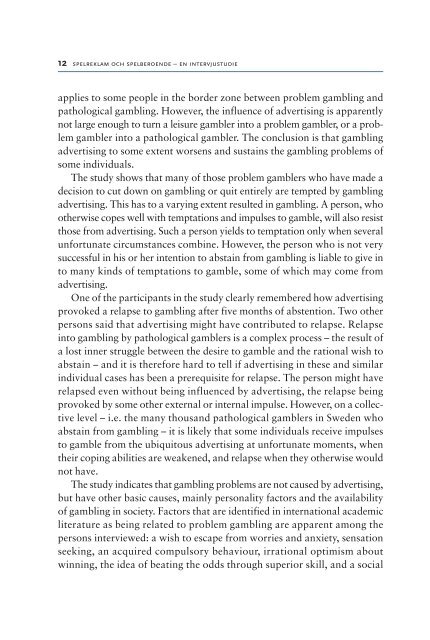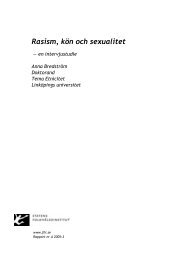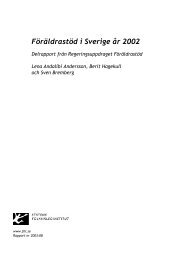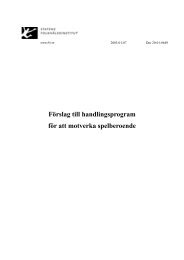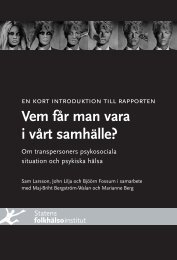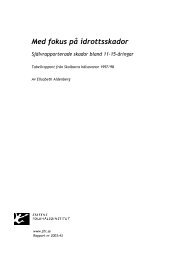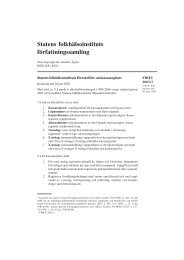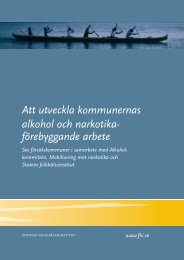Spelreklam och spelberoende - Statens folkhälsoinstitut
Spelreklam och spelberoende - Statens folkhälsoinstitut
Spelreklam och spelberoende - Statens folkhälsoinstitut
You also want an ePaper? Increase the reach of your titles
YUMPU automatically turns print PDFs into web optimized ePapers that Google loves.
12 spelreklam <strong>och</strong> <strong>spelberoende</strong> – en intervjustudie<br />
applies to some people in the border zone between problem gambling and<br />
pathological gambling. However, the influence of advertising is apparently<br />
not large enough to turn a leisure gambler into a problem gambler, or a problem<br />
gambler into a pathological gambler. The conclusion is that gambling<br />
advertising to some extent worsens and sustains the gambling problems of<br />
some individuals.<br />
The study shows that many of those problem gamblers who have made a<br />
decision to cut down on gambling or quit entirely are tempted by gambling<br />
advertising. This has to a varying extent resulted in gambling. A person, who<br />
otherwise copes well with temptations and impulses to gamble, will also resist<br />
those from advertising. Such a person yields to temptation only when several<br />
unfortunate circumstances combine. However, the person who is not very<br />
successful in his or her intention to abstain from gambling is liable to give in<br />
to many kinds of temptations to gamble, some of which may come from<br />
advertising.<br />
One of the participants in the study clearly remembered how advertising<br />
provoked a relapse to gambling after five months of abstention. Two other<br />
persons said that advertising might have contributed to relapse. Relapse<br />
into gambling by pathological gamblers is a complex process – the result of<br />
a lost inner struggle between the desire to gamble and the rational wish to<br />
abstain – and it is therefore hard to tell if advertising in these and similar<br />
individual cases has been a prerequisite for relapse. The person might have<br />
relapsed even without being influenced by advertising, the relapse being<br />
provoked by some other external or internal impulse. However, on a collective<br />
level – i.e. the many thousand pathological gamblers in Sweden who<br />
abstain from gambling – it is likely that some individuals receive impulses<br />
to gamble from the ubiquitous advertising at unfortunate moments, when<br />
their coping abilities are weakened, and relapse when they otherwise would<br />
not have.<br />
The study indicates that gambling problems are not caused by advertising,<br />
but have other basic causes, mainly personality factors and the availability<br />
of gambling in society. Factors that are identified in international academic<br />
literature as being related to problem gambling are apparent among the<br />
persons interviewed: a wish to escape from worries and anxiety, sensation<br />
seeking, an acquired compulsory behaviour, irrational optimism about<br />
winning, the idea of beating the odds through superior skill, and a social


